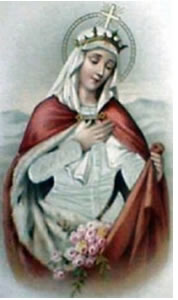Patron Saint
 Saint Elizabeth was born in Hungary in 1207 AD, the daughter of the King of Hungary, Alexander II. At the age of four she was betrothed to the child, Louis, son of the Landgrave of Thuringia to whose court she was sent to be raised and educated. She and Louis were married in 1221 and were gifted with four children. En-route to a crusade, Louis died. Elizabeth gave birth to their fourth child shortly thereafter. At the age of twenty she found herself a widow and mother of four.
Saint Elizabeth was born in Hungary in 1207 AD, the daughter of the King of Hungary, Alexander II. At the age of four she was betrothed to the child, Louis, son of the Landgrave of Thuringia to whose court she was sent to be raised and educated. She and Louis were married in 1221 and were gifted with four children. En-route to a crusade, Louis died. Elizabeth gave birth to their fourth child shortly thereafter. At the age of twenty she found herself a widow and mother of four.
From a young age Elizabeth showed a propensity for prayer and good works. Amidst the grandeur and activity of the royal court she maintained an active prayer life, which overflowed into love for the poor. Without shirking her duties as a wife and mother Elizabeth the queen visited the poor twice daily, morning and evening. She spent all of her revenue from her husband’s four principalities on the poor. She even built a hospital for the poor at the foot of the castle. She was known for taking food and clothing to the poor, carrying the sick on her back, and selling her grand royal gowns to further assist the poor of her husband’s kingdom.
Though Louis supported Elizabeth’s works of charity, many in the royal court did not. She often suffered ridicule at the court. Consequently, she often left the castle inconspicuously each day. On one occasion, as she set out to work with the poor the King surprised her. On unveiling her mantle where she carried bread for the poor, the King saw only roses. If you look closely at the statue of Saint Elizabeth in the church you will see a loaf of bread in her hand and roses in her mantle.
Upon the death of her husband, she renounced all her possessions at court and became a Third Order Franciscan. She continued to work with the poor until her death in 1231. She was only twenty four years old! Providentially for us, there was another saint who died that year, Saint Anthony of Padua, another Franciscan. Saint Elizabeth of Hungary is the great aunt of Saint Elizabeth of Portugal! She is the patroness of bakers, beggars, brides, charitable workers, countesses, falsely accused people, hospitals, in-law problems, people ridiculed for piety, toothaches, and widows, to name a few. Her feast day is celebrated on November 17.